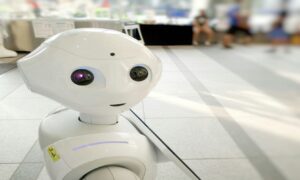In today’s fast-paced world, achieving optimal health and reaching weight goals has transcended traditional diet plans and entered the realm of advanced technology. Enter the game-changer: Artificial Intelligence (AI). With its unparalleled capacity to analyze and interpret vast amounts of data, AI is revolutionizing the way we approach nutrition and meal planning. Gone are the days of one-size-fits-all diet plans. The era of AI-driven personalized nutrition is here, promising a more efficient, effective, and tailored approach to weight management.
AI’s role in nutrition is not just about crunching numbers or tracking calories; it’s about understanding the unique dietary needs and preferences of each individual. By harnessing the power of AI, users can now receive meal plans that are not only aligned with their weight goals but are also tailored to their taste preferences, lifestyle, and even genetic makeup. This level of personalization ensures that users are more likely to stick to their meal plans, enjoy their food, and, most importantly, see tangible results.
Personalizing Nutritional Needs
Every individual’s journey to achieving their weight goals is distinct, and influenced by factors such as metabolism, activity level, dietary preferences, and health conditions. AI steps into this complex landscape with a promise of clarity and customization. By analyzing a user’s health data, dietary preferences, and even biometric information, AI-driven platforms can design meal plans that cater specifically to the user’s unique nutritional needs.
This process begins with the AI system gathering and analyzing data about the user. It’s a sophisticated dance of algorithms and analytics, where every piece of data is a crucial step towards a comprehensive understanding of the user’s nutritional requirements. From there, the AI crafts a meal plan that not only aims to achieve weight goals but also ensures that the user’s nutritional needs are met, whether it’s balancing macronutrients, ensuring adequate vitamin intake, or managing dietary restrictions.
By placing the user’s individual needs at the center of the meal planning process, AI-driven nutrition transcends traditional dieting methods, offering a personalized path to weight loss that is as unique as the user themselves. With technology as a dietary companion, users are equipped with the knowledge and support they need to make informed choices, track their progress, and ultimately, achieve their weight goals with precision and confidence.
Current nutritional status
AI-driven meal planning is not just about understanding your current nutritional status; it’s also about setting realistic, achievable weight goals tailored to your personal aspirations and health requirements. The AI system considers your target weight, time frame, and lifestyle habits to devise a plan that’s not just a diet but a sustainable lifestyle change. It adjusts your meal plan dynamically, based on your progress and any changes in your lifestyle or preferences, ensuring that your journey towards your weight goal is smooth and adaptable. But weight loss is complex, involving various factors like calorie intake, nutrient balance, and metabolic rate. AI simplifies this complexity by calculating your specific caloric and nutrient needs based on your weight loss goals, activity level, and metabolic rate. It aligns these calculations with the latest nutritional science to offer meal plans that are not only effective for weight loss but also nutritionally balanced, ensuring that your body receives all the necessary nutrients for optimal health.
Dietary Challenges
Navigating the landscape of dietary challenges is a crucial element in the success of any weight loss journey. These challenges, ranging from managing cravings to ensuring meal preparation convenience, can significantly impact one’s ability to stay consistent with their diet plan. When it comes to cravings, AI systems are adept at identifying patterns in your eating habits and suggesting healthier alternatives that not only satisfy those cravings but also align with your nutritional goals. For instance, if you consistently crave something sweet, the AI might recommend a fruit-based dessert that’s lower in calories but fulfilling, helping you stay within your caloric limits without feeling deprived.
Convenience is another critical factor in dietary adherence. Many individuals find it challenging to stick to a diet plan that requires complex meal preparations or hard-to-find ingredients. AI’s role extends beyond just meal planning; it actively monitors your progress and how you’re responding to the plan. If the AI detects signs of struggle or lack of motivation, it can adjust the intensity of the diet, perhaps by offering a more gradual calorie deficit or integrating more of your preferred foods to boost morale. This dynamic adjustment helps maintain a balance between effective weight loss and user satisfaction, reducing the likelihood of burnout or deviation from the plan.
Co-Evolving with AI
In essence, the relationship between the user and the AI in meal planning is a dynamic and evolving partnership. It’s a process where both entities learn from each other, with the AI system personalizing its approach based on user feedback and changes, and the user benefiting from a diet plan that’s continually refined to meet their preferences and health needs. This collaborative journey ensures that the path to achieving weight goals is not only effective but also enjoyable and tailored to the individual’s evolving lifestyle.
User Feedback Loop
At the heart of this co-evolution is the user feedback loop. As users interact with the AI-driven meal plans, their inputs, whether it’s feedback on meal preferences, satisfaction levels, or changes in body responses, are integral to refining the AI’s recommendations. This ongoing dialogue between the user and the AI system helps fine-tune the meal planning process, ensuring that the recommendations become more aligned with the user’s tastes and nutritional requirements over time.
Adaptive Learning
AI systems are designed with sophisticated algorithms that can learn from each interaction, adapting the meal plans based on the user’s feedback and progress. If a user consistently skips a particular ingredient or meal suggestion, the AI notes this preference and adjusts future recommendations accordingly. Similarly, if the user reports feeling more energetic or satisfied with certain types of meals, the AI incorporates this feedback to prioritize similar food choices in the future.
Balancing Nutritional Needs and Preferences
Achieving a balance between meeting nutritional needs and catering to food preferences is crucial for the sustainability of any diet plan. The AI system continuously analyzes the user’s nutritional intake against their health goals, ensuring that the meal recommendations maintain this delicate balance. It ensures that while the user’s food preferences are honored, their body’s nutritional requirements are not compromised, creating a harmonious diet plan that supports both health and enjoyment.
Final Thoughts
For individuals aiming to achieve their health and weight goals, the integration of AI-driven meal plans, health diaries, and personalized recommendations offers a comprehensive approach that ensures the best possible outcomes. When these components work in unison, they create a holistic health ecosystem that adapts and responds to the individual’s unique journey, offering a level of customization that is unparalleled. Platforms like Healthdor exemplify this integrated approach, providing users with a full suite of tools designed to work together for enhanced individual results.



















































